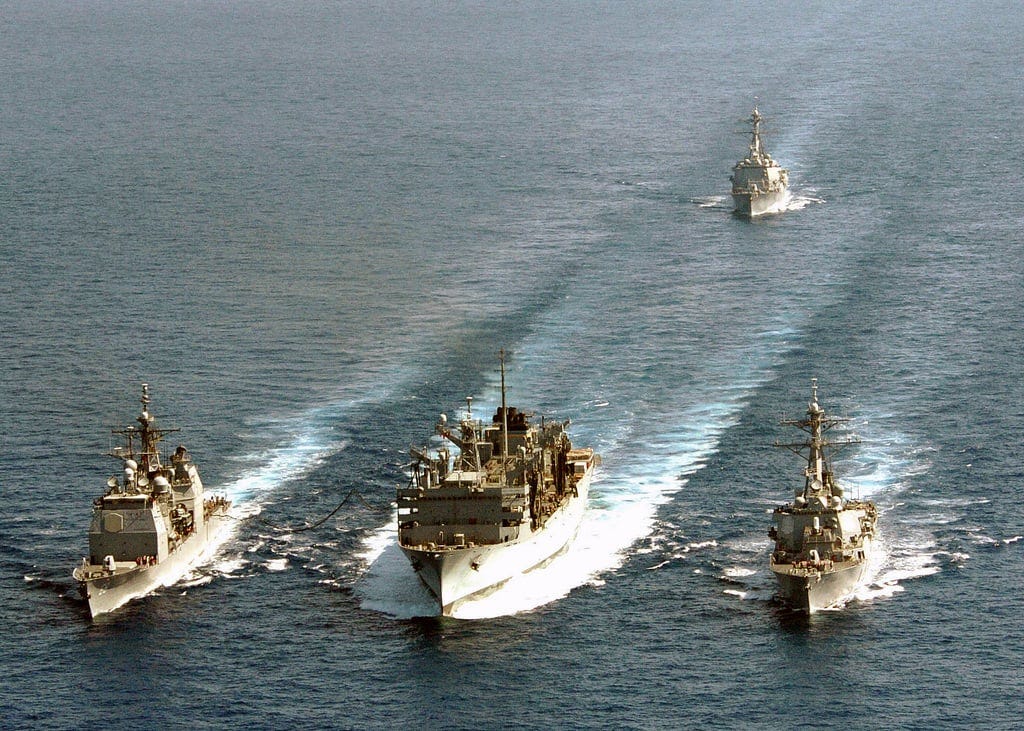US Warships Head To Venezuela as Maduro Mobilizes Militias and Bans Drone Flights
Washington ramps up military pressure while Maduro tightens internal controls, leaving Venezuelans squeezed on both sides.
The standoff between the United States and Venezuela is entering a dangerous new phase. Three U.S. guided-missile destroyers are now stationed near Venezuelan waters, a move Washington claims is part of its fight against Latin American drug cartels. At the same time, the U.S. State Department has doubled its bounty on President Nicolás Maduro to $50 million, openly treating him as a fugitive criminal.
In Caracas, Maduro has responded by ordering the mobilization of as many as four million members of Venezuela’s National Militia. These civilian auxiliaries are being armed and trained in rural areas and working-class neighborhoods. To tighten control further, his government has banned civilian drone flights, citing national security. The clear message: Venezuela is on a war footing.
Neither action offers relief to ordinary Venezuelans. The U.S. posture plays into Maduro’s narrative of imperial aggression, allowing him to justify deeper militarization and repression. Meanwhile, the government’s tightening grip only deepens a humanitarian crisis marked by food shortages, inflation, and political persecution.
The current standoff is only the latest chapter in a long history of U.S. attempts to shape Venezuela’s future. From the 2002 coup attempt against Hugo Chávez, which Washington tacitly supported, to years of sanctions designed to strangle Venezuela’s oil-dependent economy, the United States has consistently pursued regime change. Each attempt has failed to topple the government but succeeded in worsening the suffering of ordinary citizens.
By sending warships to Venezuela’s doorstep, Washington has revived memories of gunboat diplomacy across Latin America, a tactic once common in the early 20th century, when U.S. Marines occupied countries from Nicaragua to Haiti. That history still resonates deeply in the region and fuels suspicion of U.S. motives, even among governments critical of Maduro.
For Maduro, confrontation with Washington is a political lifeline. His legitimacy has been questioned since the disputed 2018 election, and again after last year’s contested vote. Massive protests, international condemnation, and ongoing economic collapse have eroded his domestic support. But every time the U.S. escalates pressure, Maduro seizes the chance to portray himself as the defender of Venezuelan sovereignty against foreign invasion.
Mobilizing millions of militia members allows him to rally his base while also spreading fear. It tightens the bond between the state and loyalist neighborhoods, creating a parallel force to the traditional military that is personally tied to Maduro’s rule. The ban on drone flights may seem minor, but it reveals how his government is clamping down on any tool that could be used for surveillance, organizing, or resistance.
While these geopolitical maneuvers play out, Venezuelans continue to suffer. The country has endured one of the most severe economic collapses outside of wartime in modern history. Hyperinflation has wiped out savings, public services have collapsed, and millions have fled the country, creating one of the largest migration crises in the world. Those who remain face shortages of medicine, intermittent electricity, and food insecurity.
Human rights organizations report that Maduro’s security forces continue to detain and torture political opponents. Protesters are arrested, independent journalists are harassed, and opposition parties are restricted. The choice for many Venezuelans is stark: live under a repressive regime, or risk life as a refugee.
Regional governments are watching closely. Colombia, which shares a long and porous border with Venezuela, fears spillover violence and an even greater influx of refugees. Brazil, under a government that has wavered between criticism of Maduro and pragmatic engagement, must weigh its economic interests against potential instability on its northern border.
Globally, Venezuela has become another fault line in the struggle between U.S. influence and alternative powers. Russia and China both maintain ties with Maduro, supplying arms, loans, and diplomatic support. Any U.S. military escalation risks drawing these powers deeper into the hemisphere, raising the stakes far beyond Venezuela’s borders.
The conflict also has a crucial economic dimension. Venezuela’s most valuable foreign asset, Citgo, is being auctioned in a U.S. court to settle claims from creditors. Competing bids, now approaching $9 billion, could strip the Venezuelan state of its most profitable holding abroad. For Washington, this represents a way to tighten the financial noose around Maduro. For Venezuelans, it means the potential permanent loss of a resource that could have been key to rebuilding the economy.
For Venezuelans, the situation is dire. They are caught between the threat of foreign intervention and the suffocating control of a government that crushes dissent. U.S. destroyers in the Caribbean will not bring democracy or prosperity, and neither will militias patrolling the streets of Caracas. What both Washington and Maduro offer is escalation, fear, and more suffering.
The country stands at a crossroads. With each new show of force from abroad and crackdown at home, the space for ordinary Venezuelans to breathe, speak, and live shrinks further. They are not the architects of this conflict, yet they remain its primary victims.




